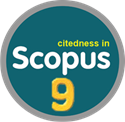Student Achievement with the Implementation of the E-Learning System: Anxiety associated with Computers and Apprehension of Oral and Written Communications
(A Replication of Fuller et al. Study)
Abstract
In the digital era, education can be done by learning not only anywhere but at any time with e-learning facilities, which are also implemented in the Accounting Study Program at Universitas Pembangunan Nasional Veteran Jawa Timur, so students also need skills in using technology, especially e-learning. Based on this background, this research aims to determine the factors influencing student achievement by implementing the e-learning system in the teaching and learning process. The sample was 81 students from the Accounting Study Program at UPN Veteran, East Java, Surabaya, using the simple random sampling technique. In implementation, the number of respondents was 74, with a return rate of 91.4%. The research variables used are computer anxiety, computer experience, email/web experience, oral communication apprehension, and written communication apprehension as independent variables, and student achievement variables as the dependent variable. To answer the problem formulation, objectives, and hypotheses, the analysis used is Multiple Regression Analysis. Based on multiple regression analysis, it can be concluded that computer anxiety and computer experience have a significant effect on student achievement, and email/web experience, oral communication apprehension, and written communication apprehension have no significant effect on student achievement or in other words email/web experience, oral communication apprehension, and written communication apprehension are not variables that cause the rise and fall of student achievement.
Downloads
References
Akcil, U., & Bastas, M. (2021). Examination of university students’ attitudes towards e-learning during the COVID-19 pandemic process and the relationship of digital citizenship. Contemporary Educational Technology, 13(1), 1–13. https://doi.org/10.30935/CEDTECH/9341
Anugraheni, T. D., Izzah, L., & Hadi, M. S. (2023). Increasing the Students’ Speaking Ability through Role-Playing with Slovin’s Formula Sample Size. Jurnal Studi Guru dan Pembelajaran, 6(3), 262–272. https://doi.org/10.30605/jsgp.6.3.2023.2825
Aulia Salsabila, & Febriani, D. (2022). Faktor yang Memengaruhi Persepsi Mahasiswa dalam Menggunakan Software Akuntansi saat Pembelajaran Jarak Jauh. Akuntansi Dan Teknologi Informasi, 15(2), 151–174. https://doi.org/10.24123/jati.v15i2.5043
Cazan, A.-M., Cocoradă, E., & Maican, C. I. (2016). Computer anxiety and attitudes towards the computer and the internet with Romanian high-school and university students. Computers in Human Behavior, 55, 258–267. https://doi.org/10.1016/j.chb.2015.09.001
Dwirandra, A. A. N. B., & Astika, I. B. P. (2020). Impact of Environmental Uncertainty, Trust and Information Technology on User Behavior of Accounting Information Systems. The Journal of Asian Finance, Economics and Business, 7(12), 1215–1224. https://doi.org/10.13106/jafeb.2020.vol7.no12.1215
Fadillah, R., & Suryaningrum, D. H. (2021). The Importance of Trust and Information Technology on Individual Performance. Public Management and Accounting Review, 2(1), 11–22. https://doi.org/10.61656/pmar.v2i1.62
Fiddin, F. F., & Arief, M. (2022). Pengaruh Computer Anxiety, Computer Attitude, Dan Computer Self Efficacy, Kondisi Yang Memfasilitasi Pemakai, Dan Faktor Sosial Terhadap Minat Mahasiswa Komputerisasi Akuntansi Menggunakan Software Akuntansi. AKUA: Jurnal Akuntansi Dan Keuangan, 1(1), 86–94. https://doi.org/10.54259/akua.v1i1.182
Fitriyah, D. L., & Hermawan, S. (2023). Pengaruh Computer Anxiety, Computer Attitude, dan Computer Self-Efficacy Terhadap Pemahaman Mahasiswa Akuntansi dalam Menggunakan Komputer Akuntansi dengan Pengetahuan Akuntansi Sebagai Variabel Moderasi (Studi Pada Mahasiswa Akuntansi Universitas Muhammadiyah). UMSIDA Preprints Server, pre-print, 1–19. https://doi.org/https://doi.org/10.21070/ups.840
Fuller, R. M., Vician, C., & Brown, S. A. (2016 online). E-Learning and Individual Characteristics: The Role of Computer Anxiety and Communication Apprehension. Journal of Computer Information Systems, 46(4), 103–115. https://doi.org/10.1080/08874417.2006.11645917
Ghozali, I. (2018). Aplikasi Analisis Multivariate Dengan Program IBM SPSS 25 (9th ed.). Semarang: Badan Penerbit Universitas Diponegoro.
Goodhue, D. L. (1995). Understanding User Evaluations of Information Systems. Management Science, 41(12), 1827–1844. https://doi.org/10.1287/mnsc.41.12.1827
Loureiro, M., Loureiro, N., & Silva, R. (2020). Differences of Gender in Oral and Written Communication Apprehension of University Students. Education Sciences, 10(12), 379 (1-20). https://doi.org/10.3390/educsci10120379
Onn, C. W., & Sorooshian, S. (2013). Mini Literature Analysis on Information Technology Definition. Information and Knowledge Management, 3(2), 139–140. https://www.iiste.org/Journals/index.php/IKM/article/view/4287
Ouajdouni, A., Chafik, K., & Boubker, O. (2021). Measuring e-learning systems success: Data from students of higher education institutions in Morocco. Data in Brief, 35, 106807. https://doi.org/10.1016/j.dib.2021.106807
Pratiwi, I. R., & Listiadi, A. (2021). Pengaruh Computer Knowledge, Fasilitas Laboratorium, Computer anxiety, dan Motivasi Belajar terhadap Hasil Belajar Siswa SMK Negeri 2 Buduran. Edunusa: Journal of Economics and Business Education, 1(2), 52–66. https://journal.inspirasi.or.id/edunusa/article/view/79
Ramantha, C. K. Y., & Ramantha, W. (2014). Pengaruh Computer Anxiety dan Computer Attitude pada Keahlian Pengguna dalam Menggunakan Komputer. E-Jurnal Akuntansi Universitas Udayana, 9(3), 644–657. https://ojs.unud.ac.id/index.php/akuntansi/article/view/9419
Schlebusch, C. L. (2018). Computer Anxiety, Computer Self-efficacy and Attitudes towards the Internet of First Year Students at a South African University of Technology. Africa Education Review, 15(3), 72–90. https://doi.org/10.1080/18146627.2017.1341291
Suryaningrum, D. H. (2012). Assessing individual performance on information technology adoption: a new model. Global Journal of Business Research, 6(4), 111–125. https://papers.ssrn.com/sol3/papers.cfm?abstract_id=2146065
Suryaningrum, D. H., Kristanto, T. B. A., Utari, S. A., Razi, F., Al-Gamar, M. F., Firdaus, A., Fatkhurozi, B. A., Cahyani, S. D., Hidayat, A. S. J., & Adityawan, B. R. (2023). Perancangan Sistem Informasi Akuntansi KedaiMoney untuk Usaha Kuliner berdasarkan SAK EMKM. Jurnal ETAM, 3(2), 270–281. https://doi.org/10.46964/etam.v3i2.539
Suryaningrum, D. H., & Takarini, N. (2012). Kemampuan Mahasiswa Berkomunikasi Lisan melalui Proses Belajar Mengajar. Jurnal Riset Ekonomi Dan Bisnis, 7(2), 1–14. http://ejournal.upnjatim.ac.id/index.php/rebis/article/view/54
Vassilakopoulou, P., & Hustad, E. (2023). Bridging Digital Divides: a Literature Review and Research Agenda for Information Systems Research. Information Systems Frontiers, 25(3), 955–969. https://doi.org/10.1007/s10796-020-10096-3
Wayman, J. C., Shaw, S., & Cho, V. (2017). Longitudinal Effects of Teacher Use of a Computer Data System on Student Achievement. AERA Open, 3(1), 233285841668553. https://doi.org/10.1177/2332858416685534
Copyright (c) 2024 Munari Munari, Vivin Alfiyatun Roshida

This work is licensed under a Creative Commons Attribution 4.0 International License.














